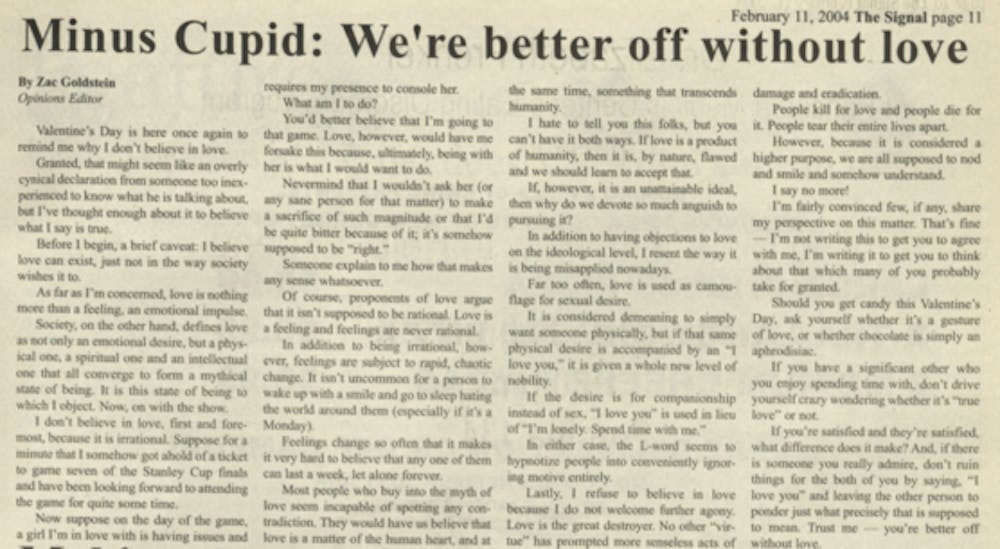By Liya Davidov
Features Editor
Valentine’s Day is quickly approaching. Bouquets are being wrapped, chocolates are selling out and dinner reservations are being made. This time of year is like no other, as friends and partners alike overthink their relationships and scramble to put together something agreeable.
In a February 2004 issue of The Signal, editor Zac Goldstein shares his personal definition of love and opinion on the holiday.

As far as I’m concerned, love is nothing more than a feeling, an emotional impulse. Society, on the other hand, defines love as not only an emotional desire, but a physical one, a spiritual one and an intellectual one that all converge to form a mythical state of being. It is this state of being to which I object. Now, on with the show.
I don’t believe in love, first and foremost, because it is irrational. Suppose for a minute that 1 somehow got ahold of a ticket to game seven of the Stanley Cup finals and have been looking forward to attending the game for quite some time.
Now suppose on the day of the game, a girl I’m in love with is having issues and requires my presence to console her.
What am I to do?
You’d better believe that I’m going to that game. Love, however, would have me forsake this because, ultimately, being with her is what I would want to do.
Nevermind that I wouldn’t ask her (or any sane person for that matter) to make a sacrifice of such magnitude or that I’d be quite bitter because of it; it’s somehow supposed to be “right.”
Someone explain to me how that makes any sense whatsoever.
Of course, proponents of love argue that it isn’t supposed to be rational. Love is a feeling and feelings are never rational.
In addition to being irrational, however, feelings are subject to rapid, chaotic change. It isn’t uncommon for a person to wake up with a smile and go to sleep hating the world around them (especially if it’s a Monday).
Feelings change so often that it makes it very hard to believe that any one of them can last a week, let alone forever.
Most people who buy into the myth of love seem incapable of spotting any contradiction. They would have us believe that love is a matter of the human heart, and at the same time, something that transcends humanity.
I hate to tell you this folks, but you can't have it both ways. If love is a product of humanity, then it is, by nature, flawed, and we should learn to accept that.
If, however, it is an unattainable ideal, then why do we devote so much anguish to pursuing it?
In addition to having objections to love on the ideological level, I resent the way it is being misapplied nowadays.
Far too often, love is used as camouflage for sexual desire.
It is considered demeaning to simply want someone physically, but if that same physical desire is accompanied by an "I love you," it is given a whole new level of nobility.
If the desire is for companionship instead of sex, "I love you" is used in lieu of "I'm lonely. Spend time with me."
In either case, the L-word seems to hypnotize people into conveniently ignoring motive entirely.
Lastly, I refuse to believe in love because I d o not welcome further agony. Love is the great destroyer. No other "virtue" has prompted more senseless acts of damage and eradication.
People kill for love and people die for it. People tear their entire lives apart. However, because it is considered a higher purpose, we are all supposed to nod and smile and somehow understand. I Say no more!
I'm fairly convinced f ew, if any, share my perspective on this matter. That's fine — I'm not writing this to get you to agree with me, I'm writing it to get you to think about that which many of you probably take for granted.
Should you get candy this Valentine's Day, ask yourself whether it's a gesture of love, or whether chocolate is simply an aphrodisiac.
If you have a significant other who you enjoy spending time with, don't drive yourself crazy wondering whether it's "true love" or not.
If you're satisfied and they're satisfied, what difference does it make? And, if there is someone you really admire, don't ruin things for the both of you by saying, "I love you" and leaving the other person to ponder just what precisely that is supposed to mean. Trust me — you're better off without love.







